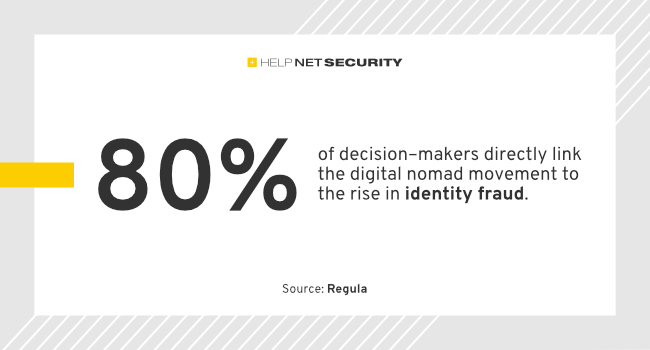Digital nomads amplify identity fraud risks
3 min readThe number of foreign document verification cases in all parts of the world has grown by an average of 21% since the summer of 2021, according to Regula.

It’s even higher in the US and UAE: these countries are experiencing a 25% increase. As for industries, Insurance appears to be dealing with the majority of foreign IDs (+27% compared to summer 2021), followed by Financial and Banking Services (+25%).
Foreign clients drive identity fraud spike
To live the life of a digital nomad, professionals must routinely subject themselves to complex processes to safely identify themselves everywhere they go. The result is that digital nomads come across systems for identity verification more often than most people do.
Identity verification (IDV) of digital nomads can be a tricky task for many businesses as their established processes are not designed for such a large variety of foreign IDs, and thus require revamping.
This difficulty potentially increases the risk of organizations facing more identity fraud. 40% of business decision-makers highlight the increase in fraud as a primary challenge when it comes to identity verification for digital nomads. The UAE and Mexico are even more agitated, as 51% and 49% of decision-makers in those countries feel the risk of falling victim to fraud.
Furthermore, 80% of decision-makers directly associate the digital nomad movement with identity fraud, saying that it is increasing the number of forged or counterfeited documents organizations find during verification. The average growth in identity document fraud is stated to be 14%; however, in the Insurance industry, it is 22%, and in the Financial and Banking Services it is nearly 19%.
Identity verification with e-docs
Businesses need to be able to verify the identities of digital nomads without opening themselves up to undue risk of fraud. Equally, nomads need to be able to verify their own identities to businesses quickly and without risking their privacy, their documents, or their identity.
This situation is forcing businesses to introduce new methods and technologies for identity verification. 57% of organizations have implemented biometric authentication to detect and prevent fraud during the digital onboarding process.
To combat document forgery, 53% of respondents say they have decided to verify only electronic documents—i.e., ones that contain an RFID chip, a reliable security feature that makes counterfeiting almost impossible. The most vulnerable industries, Financial Services and Insurance, are even more inclined to switch to this option: 61% of decision makers from these sectors confirmed they are already accepting only e-docs.
The option to grant access to products and services only to digital nomads who have electronic documents seems to be an effective measure. It can help organizations cope with the growing number of various IDs by limiting their possible variety. It also facilitates document verification, since e-docs are currently considered to be the most secure.
However, to be able to combat document fraud, it’s not enough to rely only on document security features. While it’s nearly impossible for fraudsters to counterfeit a microchip in an electronic passport, they can still manipulate its data or intercept verification results on a smartphone. That is why organizations need a “zero-trust-to-mobile” approach and a reliable NFC verification technology to confirm the authenticity of both the chip and its data.
“Identity fraud is flourishing, and overall digitalization, along with mass people movement and relocation are creating new pitfalls for businesses, which are trying to keep pace. In this changing world, organizations inevitably need to start adopting new technologies to enable robust and reliable verification, especially for remote processes. They will also be interested in the possibilities to scale and adapt their IDV processes to new scenarios and requirements,” says Henry Patishman, Executive VP, Identity Verification Solutions at Regula.



